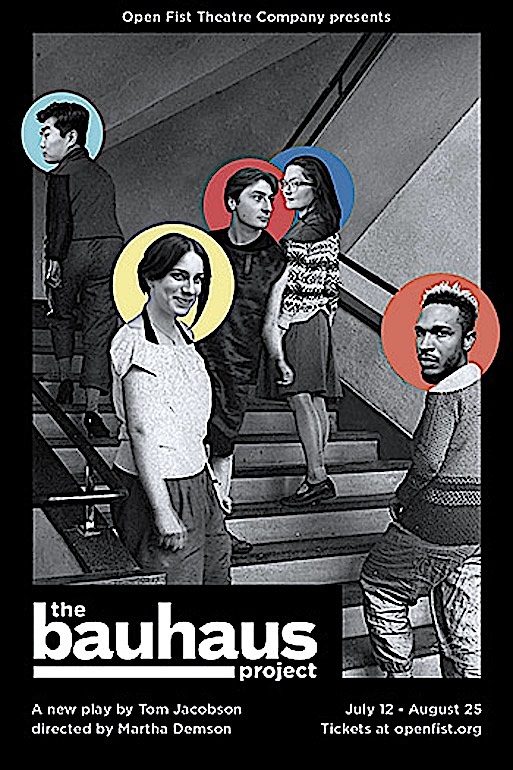By Robert St. Martin
Los Angeles, California (The Hollywood Times) 07/25/2024
Last weekend was the opening of a new play The Bauhaus Project – a production in two parts that looks at the rise of fascism and anti-Semitism in pre-war Germany and its effect on the progressive, cutting-edge art movement at the time. Staged at the Atwater Village Theatre by the Open Fist Company, Tom Jacobson’s two-part play provides a dense history of the pioneering German Bauhaus School from Weimar to Dessau to Berlin. “The Bauhaus Project takes place on several levels,” explains Open Fist artistic director Martha Demson, who worked closely with Jacobson to develop the piece and is directing. “The framing device is a play within a play in which modern-day art school students trace the historical narrative of the Bauhaus, a groundbreaking art school committed to ‘marrying beauty with utility’ that was closed by the Nazis in 1933. Meanwhile, the production design will emphasize the enormous influence of the Bauhaus and the exhilaration of cross-disciplinary collaboration.”
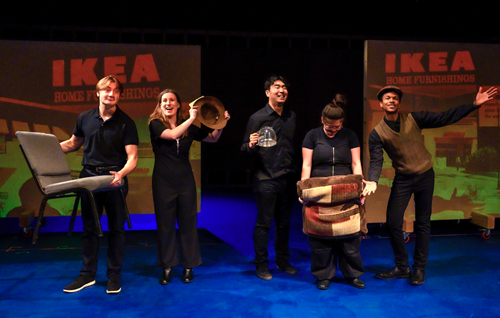
In this provocative play-within-a-play, five Southern California art students (seemingly from Art Center in Pasadena) re-enact the history of the famous Bauhaus School, using their respective disciplines of environmental design, music, fine art, graphic design and theater to recreate the dramatic history in real time. Each of the students portrays multiple historic Bauhaus figures, many of whom later fled to the U.S. or died in concentration camps, including architect and Bauhaus founding director Walter Gropius and his successors, architects Hannes Meyer and Ludwig Mies van der Rohe; painters Paul Klee, Wassily Kandinsky, Oskar Schlemmer and Lyonel Feininger; textile artists Gunta Stolzl, Maria Kipp and Otti Berger; furniture designer Marcel Breuer; photographer Laszlo Moholy–Nagy; graphic designer Herbert Bayer; composers Arnold Schönberg and Alma Mahler; and architects Ludwig Hilberseimer and Fritz Ertl — the latter of whom would go on to design buildings at Auschwitz.
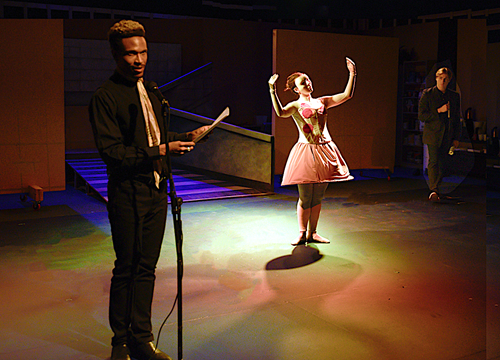
Part I, which focuses on the school’s founding and early years in the city of Weimar, while Part 2, which looks at the school’s moves, first to Dessau, then to Berlin, in the face of increasing Nazi scrutiny. This very long play is densely packed with personalities from the Bauhaus years and, even for someone like me, with a knowledge of the Bauhaus movement in Germany, the pacing is daunting. Being a play-with-a-play, Part I is frontloaded with much background information about the evolution of Bauhaus under the leadership of German architect Walter Gropius (played excellently by Jack Goldwait), as we encounter five Southern-California art students, each from different disciplines, who are asked to create an historical account of the Bauhaus years because they are on academic probation. The ensemble features five talented young actors, three of whom are fresh out of CalArts. They take on a plethora of roles as historical figures, some better than others, depending on the demands of the script.
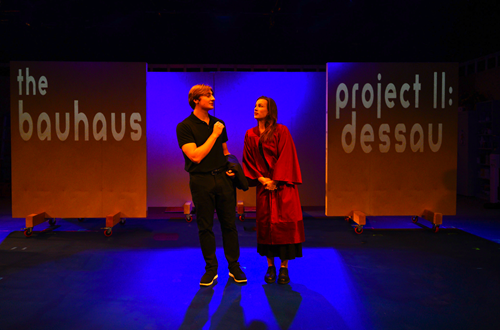
Part I gets off to a wobbly start with all the competitive jousting between the five art students, but eventually the story of the Bauhaus years from 1919 to 1925 emerged, under the tutelage of Walter Gropius (Jack Goldwait), who was actually married to Alma Maher (played by Katarina Joy Lopez), the vibrant, sexy and musically gifted ex-wife of Austrian composer Gustav Mahler. During the Weimar years of Bauhaus, the eccentric Swiss expressionist painter Johannes Ittan (John C. Sweet) taught the introductory course to all Bauhaus students. Gunta Stötzl (played by Chloe Madriaga) was a German textile designer and the only female Master at the Bauhaus. We see a little of Swiss painter Paul Klee (c) and a delightful portrayal of the Russian painter Wassily Kandinsky (Sang Kim).
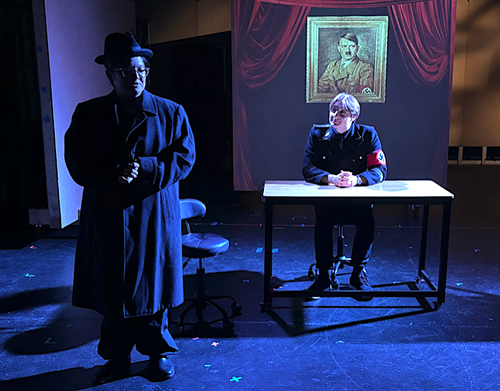
As I noted, this is a long play in basically four protracted acts and was staged on two separate nights. Part 2 is the stronger part and works better as the ensemble cast settle in their major roles. Most certainly Chloe Madriaga is brilliant in tackling the role of Master Textile Designer Gunta Stölz and the only female Master who served at the Bauhaus Institute. Madriaga captures the heart of the Bauhaus movement in its final years in Dassau and Berlin from 19325 to 1933 – as its third and final director, Mies van de Rohe – who stands as a true believer in the principal of free expression apart from politics.
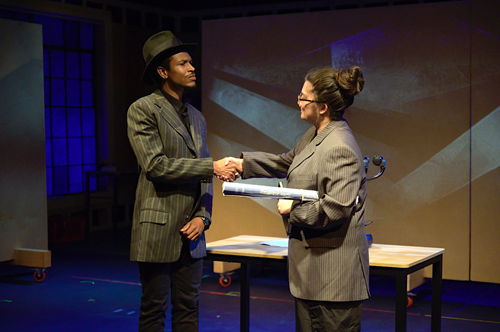
From the start of the play Katarina Joy Lopez, being a theatre student, wants to direct the student play and even take on the role of a Nazi despite her complete lack of knowledge about the history of Bauhaus. She is quite entertaining as Alma Maher, wife of Bauhaus founder Walter Gropius. In Part 2, she provides a sweet portrayal of the Jewish Croatian student Otti Berger, who later taught at Bauhaus. Equally clueless at the start is the Chinese music student Duk Liu (played by Korean American actor Sang Kim), who later emerges as Wassily Kandinsky in a strong performance. Most entertaining is the John C. Sweet as the effervescent painter and choreographer Oskar Schlemmer. Towards the end of Part 2, we encounter Jack Goldwait as the chilling Nazi critic Paul Schultze-Naumberg, whose fervent dislike for abstract painting will send Wassily Kandinsky packing.
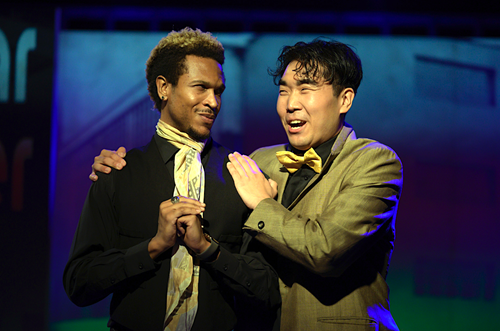
Some characters have stronger presences than others and that goes back to the dense nature of the play’s historical sweep. The ensemble cast put their hearts into it, juggling so many characters and bringing the complex personalities of the Bauhaus teachers to life. A bit lurching as was the start of Part I, the final motions of Art II as the students emerge from their performance of the student play “The Bauhaus Project” left me a bit disappointed with the unnecessarily cute ending. In all, this production featured an admirable ensemble performance by a talented set of young actors and deserves credit for bringing to the fore the challenge of artistic expression in a time of political upheaval.
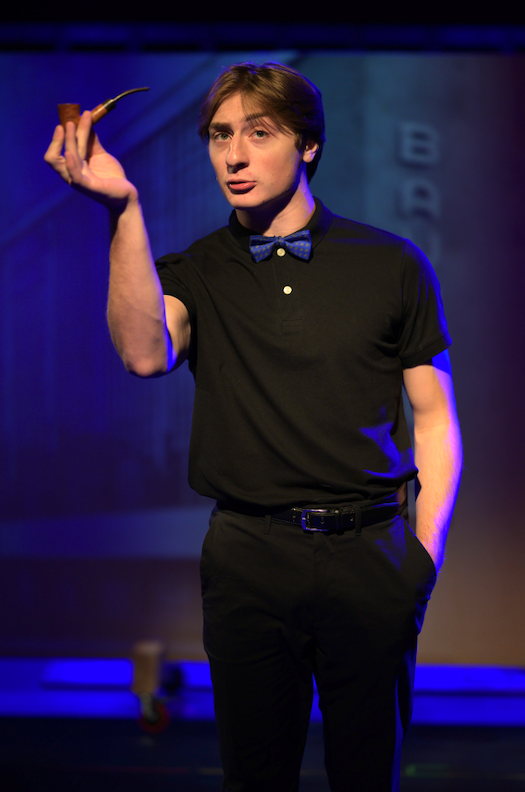
The Bauhaus Project at the Atwater Village Theatre is staged on these nights: Fridays at 8 p.m. Part 1 (Bauhaus Weimar): July 19 (opening night), July 26, Aug. 2, Aug. 9, Aug. 16, Aug. 23; Saturdays at 4 p.m.: Part 1 (Bauhaus Weimar): July 13 (preview), July 20, July 27, Aug. 3, Aug. 10, Aug. 17, Aug. 24; Saturdays at 8 p.m.: Part 2 (Bauhaus Dessau & Bauhaus Berlin): July 20 (opening night), July 27, Aug. 3, Aug. 10, Aug. 17, Aug. 24; Sundays at 4 p.m.: Part 2 (Bauhaus Dessau & Bauhaus Berlin) July 14 (preview), July 21, July 28, Aug. 4, Aug. 11, Aug. 18, Aug. 25.
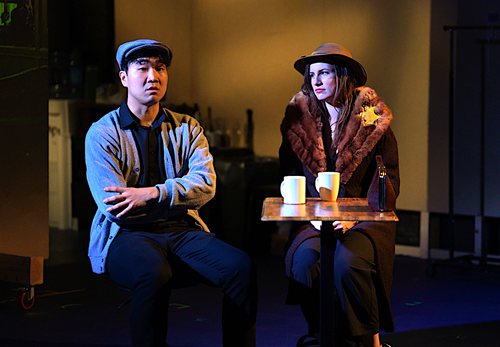
Tickets: Part 1 and Part 2 (combination ticket): $50. Part 1 or Part 2 (individual ticket): $35. Students receive $5 off either price. For tickets, go to: www.openfist.org.


